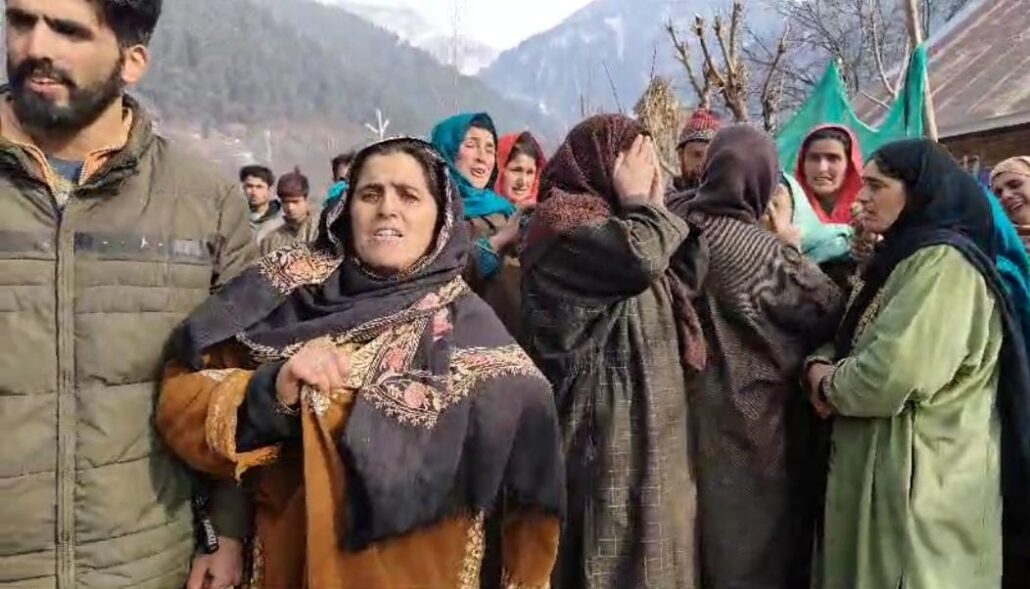
Suhail Dar
Months after the Budgam incident, Kashmir’s media landscape and public discourse remain abuzz with issues of all kinds. Yet, brutal murders of women seem to slip through public discourse without sustained attention.
It was March 2023, a gruesome crime shocked Kashmir when a young woman, 30-year-old Arifa Bano from Soibugh in Budgam, went missing on her way to computer classes. Arifa was brutally murdered by Shabir Ahmad Wani, who confessed to killing her, dismembering her body into several pieces, and burying the parts at different locations to hide the crime.
The incident sparked outrage and deep sadness in the community. However, despite the horror of the crime, discussions around it faded quickly from public discourse, highlighting the societal apathy toward gender-based violence in Kashmir.
Several members of society, however, shifted the blame onto women, perpetuating a culture of victim-blaming. In a male-dominated discourse, such crimes are often overshadowed by debates on moral policing, sectarian divides, and critiques of journalists, diverting attention from addressing the root causes of violence and injustice.
Today, this neglect and indifference have paved the way for yet another brutal murder, a chilling reminder of the consequences of inaction.
In another shocking case of violence against women, a young woman was brutally murdered in South Kashmir’s Anantnag district. The incident has sent shockwaves across the region, yet it remains under-discussed in the broader public sphere.
In a chilling case from Halmullah, Haapatnaad in south Kashmir’s Anantnag district, Shabnam, a six-months-pregnant woman in her early 30s, was brutally murdered by her husband, Imran Khan, last October.
Her remains were discovered months later in a cowshed. According to the police, Imran Khan strangled Shabnam with a rope, suspecting her of infidelity due to her frequent phone use.
“He claimed she was having an affair and, in a fit of rage, killed her during an argument,” a Police official said. Following the murder, Imran buried her body outside their home but later exhumed it, burned the remains with petrol, and buried them in a cowshed to conceal the crime.
The case came to light when Imran filed a missing person report at the Aishmuqam police station on October 6, alleging that Shabnam had disappeared on October 4.
“From the beginning, there were inconsistencies in his account. His initial statements did not match the timeline, and his behavior was suspicious, which led to a deeper investigation,” Police said.
During interrogation, Imran confessed to the crime. Evidence, including strands of hair, bone fragments, and the rope used for strangulation, was recovered. Imran’s mother has also been arrested for her alleged role in covering up the crime. “She is suspected of aiding her son in hiding the body and assisting in the concealment of evidence,” the police added.
Shabnam’s troubled marital history has added complexity to the case. She was Imran’s second wife; they had one son and were expecting another child. Imran had not divorced his first wife, with whom he has two children.
Shabnam’s first husband, a policeman, also refused to grant her a divorce despite family and community intervention. “She had a tough life and sought solace in her second marriage, but that, too, became a source of pain,” said a family friend.
The victim’s family initially believed she might have fled voluntarily, considering her past decisions, but their suspicions grew due to Imran’s inconsistent behavior. “We knew something was wrong when he avoided questions and gave evasive answers,” said Shabnam’s brother.
Her first husband and his family have remained distant, refusing to attend her funeral.
Shabnam’s murder has brought issues like domestic violence, toxic marital relationships, and societal indifference to the forefront.
“This isn’t just a crime; it’s a wake-up call for all of us,” said a local women’s rights activist.
The family is now fighting for custody of Shabnam’s young son while the police continue their investigation under FIR No. 1, 2025. The authorities have assured that they will continue working on the case until justice is served.
The victim’s family, speaking amidst their grief, demanded swift justice. “She was young, full of life, and had so much ahead of her. Her life was taken from her in such a horrifying way. We demand the harshest punishment for the murderer,” a family member said.
Community leaders in Anantnag have echoed the family’s calls for justice, pointing out the need for stronger measures to address rising crimes against women in the region. “This is not just about one case. It reflects a dangerous trend that we, as a society, cannot ignore,” a local activist noted.
The silence surrounding these tragedies—be it Arifa’s case in Budgam or this latest atrocity in Anantnag—calls for urgent introspection and action. Without systemic change and societal accountability, the cycle of violence against women in Kashmir is unlikely to break.




